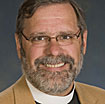Commentary on Mark 13:1-8
In the current culture, it’s hard to gauge how people hear the predictions and imagery of apocalyptic literature.
The underlying message of apocalyptic prophecy is in the great final battle in the cosmic spiritual realm, God will prevail over the evil one. The effects of that victory will be manifest even in our material earthly realm as the residual powers and influences of the evil one lose their momentum and source of energy.
Those in our congregations who understand there to be a connection between the cosmic realm (where angels and demons dwell) and the material realm (where we mortals live our lives) will find these promises compelling because the same God is in action. The question is whether more existentialist and materially-minded Christians will dismiss apocalyptic as too quaint and mythic.
Jesus’ discourse in Mark 13 presents an interesting puzzle. Is Jesus speaking in Daniel-like terms of the cosmic final battle or of more near-term ends brought about by political and religious forces? A reading of the whole chapter leaves me perplexed and answering, “Yes, both/and.”
In some places, Jesus speaks of human-scale events. Within today’s assigned verses, Jesus uses a disciple’s awe at the temple as a prompt for reminding them that even these amazing edifices are temporary. Just beyond our reading, Jesus assumes that the people before him–Peter, James, John, and Andrew–will be alive to experience all the happenings. Mark 13:9ff, for example, speak of the disciples being handed over to councils and needing to bear witness; and both 13:2 and 13:14 are possible references to the historic destruction of the Jerusalem temple in 70 C.E.
On the other hand, the language of verses 6-8 (especially in a lectionary context that includes a reading from Daniel 12) sounds a more cosmic note. The disciples ask for signs, dates and omens. Jesus’ response is to describe–though not with any specific predictions–classic signs of destruction beyond the merely local: wars, famines, earthquakes. Later in the chapter (verses 24-26), Jesus will broaden the scope and speak of the disintegration of the heavens and the coming of “the Son of Man.”
When I’m sitting in the congregation on November 15, I’d like to hear about the end. You, preacher, can decide how literal, spiritual, or metaphorical you want to be. My desire though is to be reminded that our faith is teleological–oriented toward fulfillment. Though our mundane lives are organized around various concentric and overlapping daily, weekly, and yearly cycles, the Christian faith is essentially a linear faith. God has a mission, God is fulfilling and perfecting, God is shaping the future toward an end. As I read and hear these scriptures about “the end,” I am challenged to know how to bring them into conversation with my experience of life.
Are we talking about the cosmic end of all things when the sun burns up billions of years from now (and whether there will even be humans left to see it)? Or are we speaking of the end of earth’s ability to sustain human life, whether through Armageddon, natural cataclysm, or human mismanagement? Or are we talking about the end of a certain cultural “way of life” (free-market capitalism, mainline denominationalism, or Western-style democracy)? Or are we talking about judgment day?
Mark 13–in its entirety for sure, but even in the eight verses of today’s pericope–has the potential to speak at many of these levels. In each case, I yearn to know what a faithful response looks like. Is there more to it than Jesus’ simple admonition in verse 7: “Do not be alarmed?”
If you do elect to address the cosmic realm of apocalyptic, please don’t make the work of Tim LaHaye or Hal Linsday your foil. At worst you will sound like a bully. At best, assuming you are charitable and are able to acknowledge the social woundedness and impotent anger that causes some people to turn to apocalyptic paraphrases, you will sound like a caring, patronizing bully.
Instead, let your foil be the reality of Evil. Although Satan remains a compelling mythic figure (even for materialists!), the reading from Mark suggests that evil is embodied more in the principalities, powers, and natural forces that lead toward war, famine, and uprising. Help me to flesh out what it means to stand in the faith!
Though I generally elect to respect and obey the lectionary, here is a case where I wish that verses 9-12 could be added to the reading. But even if they are not read, the sermon can use Jesus’ exhortations about testimony and the faithfulness of the Holy Spirit to flesh out his simple, “do not be alarmed,” in verse 7.

November 15, 2009